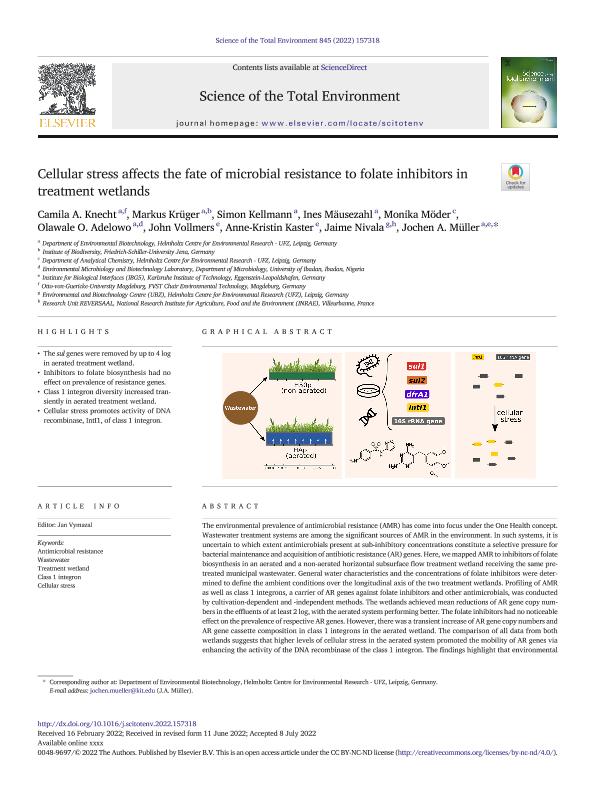Artículo
Cellular stress affects the fate of microbial resistance to folate inhibitors in treatment wetlands
Knecht, Camila Ayelén ; Krüger, Markus; Kellmann, Simon; Mäusezahl, Ines; Möder, Monika; Adelowo, Olawale O.; Vollmers, John; Kaster, Anne-Kristin; Nivala, Jaime; Müller, Jochen A.
; Krüger, Markus; Kellmann, Simon; Mäusezahl, Ines; Möder, Monika; Adelowo, Olawale O.; Vollmers, John; Kaster, Anne-Kristin; Nivala, Jaime; Müller, Jochen A.
 ; Krüger, Markus; Kellmann, Simon; Mäusezahl, Ines; Möder, Monika; Adelowo, Olawale O.; Vollmers, John; Kaster, Anne-Kristin; Nivala, Jaime; Müller, Jochen A.
; Krüger, Markus; Kellmann, Simon; Mäusezahl, Ines; Möder, Monika; Adelowo, Olawale O.; Vollmers, John; Kaster, Anne-Kristin; Nivala, Jaime; Müller, Jochen A.
Fecha de publicación:
11/2022
Editorial:
Elsevier
Revista:
Science of the Total Environment
ISSN:
0048-9697
Idioma:
Inglés
Tipo de recurso:
Artículo publicado
Clasificación temática:
Resumen
The environmental prevalence of antimicrobial resistance (AMR) has come into focus under the One Health concept. Wastewater treatment systems are among the significant sources of AMR in the environment. In such systems, it is uncertain to which extent antimicrobials present at sub-inhibitory concentrations constitute a selective pressure for bacterial maintenance and acquisition of antibiotic resistance (AR) genes. Here, we mapped AMR to inhibitors of folate biosynthesis in an aerated and a non-aerated horizontal subsurface flow treatment wetland receiving the same pre-treated municipal wastewater. General water characteristics and the concentrations of folate inhibitors were determined to define the ambient conditions over the longitudinal axis of the two treatment wetlands. Profiling of AMR as well as class 1 integrons, a carrier of AR genes against folate inhibitors and other antimicrobials, was conducted by cultivation-dependent and -independent methods. The wetlands achieved mean reductions of AR gene copy numbers in the effluents of at least 2 log, with the aerated system performing better. The folate inhibitors had no noticeable effect on the prevalence of respective AR genes. However, there was a transient increase of AR gene copy numbers and AR gene cassette composition in class 1 integrons in the aerated wetland. The comparison of all data from both wetlands suggests that higher levels of cellular stress in the aerated system promoted the mobility of AR genes via enhancing the activity of the DNA recombinase of the class 1 integron. The findings highlight that environmental conditions that modulate the activity of this genetic element can be more important for the fate of associated AR genes in treatment wetlands than the ambient concentration of the respective antimicrobial agents. By extrapolation, the results suggest that cellular stress also contributes to the mobility of AR gene in other wastewater treatment systems.
Archivos asociados
Licencia
Identificadores
Colecciones
Articulos(IMPAM)
Articulos de INSTITUTO DE INVESTIGACIONES EN MICROBIOLOGIA Y PARASITOLOGIA MEDICA
Articulos de INSTITUTO DE INVESTIGACIONES EN MICROBIOLOGIA Y PARASITOLOGIA MEDICA
Citación
Knecht, Camila Ayelén; Krüger, Markus; Kellmann, Simon; Mäusezahl, Ines; Möder, Monika; et al.; Cellular stress affects the fate of microbial resistance to folate inhibitors in treatment wetlands; Elsevier; Science of the Total Environment; 845; 11-2022; 1-10
Compartir
Altmétricas



